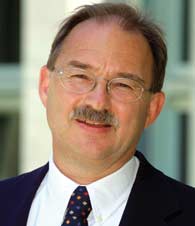|
Executive Interviews: Interview with Bill Fischer on Building High Performance Teams
May 2009
-
By Dr. Nagendra V Chowdary
It must be a dream for every
company to have virtuoso teams, for
their promising potential. Yet, as you
observed, “despite such potential,
most companies deliberately avoid
virtuoso teams, thinking that the risks
are too high.” Why do companies
avoid virtuoso teams knowing fully
well the potential benefits of having
virtuoso teams?
We think that most managers are
intimidated by great talent, and are
afraid of creating the challenging
environment which celebrates
opinions and egos. In our view, we
want opinions, and they tend to
come along with egos; so that’s the
price to be paid to get better ideas.
Most managers, we believe, find it
less stressful to work with
“harmonious” groups, but ultimately
pay the price of getting “harmonious”
results, when bold, and ambitious
ones are required. One of the biggest stumbling blocks
for any team performance is
individuals' egos and idiosyncrasies.
However, you have suggested
building the group ego. How to build
group ego and what are the benefits of
building group ego?
When you are facing the need for “big
change”, you need more, rather than
fewer, opinions. Note that we are
speaking about opinions and not just
“information.” In such situations we
need opinions because they represent
pre-digested information and, as a
result, it is quicker and more efficient
to work with opinions. But, opinions
are typically associated with egos,
and so this is a prescription for a
more difficult management situation.
The group ego is really “pride” of
association with other great
individual performers, who are
allowed to continue to be great
individual performers, even though
they are now part of a team. When these project teams are “branded”,
such as Apple’s Lisa, Mac, or iPod
teams, Apollo 13, Microsoft’s x-Box
team, Intel’s Pentium team, etc., this
group pride also becomes visible and
portable, and works to become an
important part of the individuals’
resumes. What happens to virtuoso teams in
these current economic crisis times?
We think that they become evenmore
important than when times are good.
We’ve never been in a crisis such as
this before; we need more good ideas
than ever, and this calls for more
virtuoso team experiences. As my coauthor,
Andy Boynton, has observed
last fall in The Boston Globe: When
you have to rethink the whole
financial system [which we do]... You
want the smartest people in the world
at the table figuring it out. Candidates
should be willing to labor around the
clock. They’ll be required to toil
together in close proximity and at a
frenetic pace. They must hammer out
breakthrough solutions, putting aside
politics, ignoring general consensus,
and sparing no one’s feelings.” It
makes sense, doesn’t it? And, we
need similar approaches at all other
levels, including the firm. The world is in the midst of an
unprecedented crisis created by a few
greedy investment bankers. The
effects of this crisis are quite
pronounced. What is the importance
of team work and high performance
in such troubled times?
Teams have a higher probability of
having more good ideas than
individuals do, and VTs have a much
higher probability than do your
typical teams. In addition, those ideas
need to be novel and we need to
generate them faster, rather than
slower. Virtuoso Teams provide our
best hope for such achievement. What according to you are high
performance teams? What are their
unique characteristics? Can you give
examples of a few companies that
have created and nurtured high
performance teams?
One good way to compare highperforming
teams with VTs, is to
consider the fortunes of all-star teams
in sports, where individual stars are
typically recruited to such teams,
whether they are football, cricket,
basketball, or baseball, and yet they
are not forced to be all-star
individuals within a team context.
The failure is typically not so much
that of the all-star performer, as it is
with the leader, who all too often fails
to exercise the discipline that is
needed to move a team from
individuals operating individually, to
all-star individuals operating within a
teamcontext.
|
